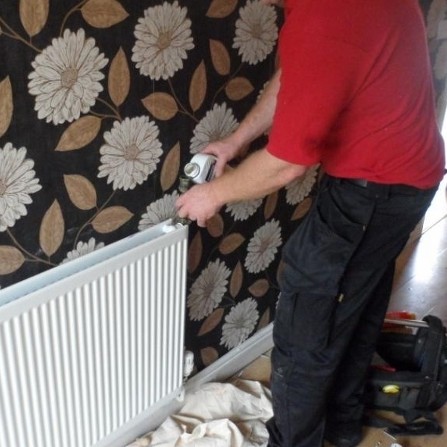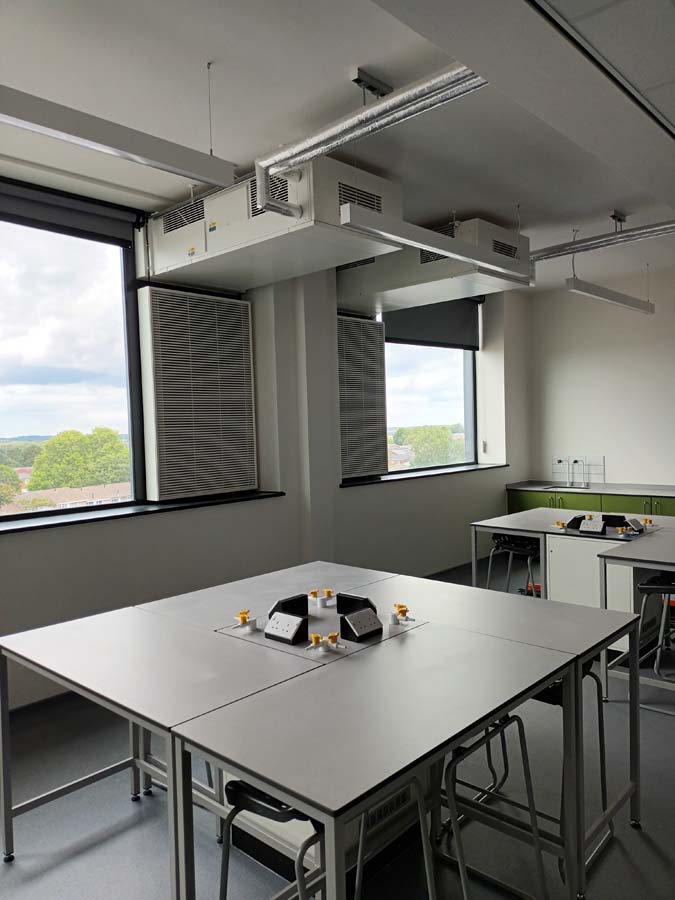
As part of a Decent Homes impact assessment, Nottingham City Homes (NCH) has carried out an experiment to prove that retrofitting new low water content radiators in its properties will save around 5 per cent on heating bills.
The ground breaking trial was carried out in one of NCH’s vacant social homes by Denis Jahic, a Nottingham Trent MSc student, comparing Quinn Round Top low water content radiators against standard convector radiators.
NCH manages around 29,000 council homes in the Nottinghamshire area. Under its Secure, Warm, Modern programme, the housing organisation aims to bring all of its council homes up to and above the national Decent Homes standard with an investment of around £187 million between 2008 and 2015. This includes replacing all single glazed windows with ‘Secured by Design’ double glazing units and improving heating systems.
As part of a Knowledge Transfer Partnership, Nottingham Trent University was working with NCH to carry out a study to assess the impact of the energy efficiency improvements made through the Secure, Warm, Modern programme. Steve Cooper, project manager from NCH, explains: “As part of our Decent Homes impact assessment, we knew the reduction in fuel costs achieved through retrofitting new boilers and windows. However, no trials had ever been carried out for radiators and this was the missing piece of the puzzle. We were already fitting Quinn Round Top low water content radiators in a few properties because the manufacturer claimed they were more efficient than others on the market but we wanted to test out these claims in a real life situation to assess the potential fuel reduction if we were to retrofit the radiators in other properties.”
As part of his MSc in Project Management, Nottingham Trent student Denis Jahic decided to complete the picture and set up an experiment in one of NCH’s vacant social homes to compare the performance of Quinn’s Round Top low water content radiators against the standard convector radiators found in many of NCH’s properties. The property already benefitted from an A rated condensing gas boiler and four standard convector radiators, so the trial used four Quinn Round Top low water content radiators to make the experiment a like for like. Four individual experiments compromising of two sets were conducted over a 14 day period in order to test the radiators’ energy usage.
The first step was for the engineers from NCH to flush the system and make sure everything was clean, safe and working correctly. During the engineers work, a Multi-input Thermometer and Data Logger were installed with all of the temperature sensors required to measure the temperatures needed. Following this, control settings were made to switch the system on at 16:00 and switch it off at 00:00, then switch it on again at 04:00 and switch it off again at 11:00. The boiler temperature was set to its maximum setting of 60â°C and thermostat controls were set to their maximum temperature of 35â°C. Once each experiment had finished, gas meter readings were logged and temperature data from the Multi-input Thermometer and Data Logger recorded on a laptop for analysis.
Over the test period, the Quinn radiators made an average saving of 3.138m3 of gas, equating to a 5% energy saving against the standard radiators. The property used was an old bungalow, which wasn’t well insulated and had many air gaps throughout. NCH engineers estimate that this 5% figure could rise by 1 to 2% if the property is well insulated with proper heating controls throughout the system.
Denis Jahic explains: “My conclusions were that Quinn radiators made a 5% saving over the 14 day experiment, proving that they are indeed more energy efficient than standard radiators of a similar type. While a small energy saving can be made in standard homes, it would be a significant saving when spread across many homes. The Office for National Statistics claim that there are 21,660,000 occupied households in the UK. This demonstrates how much energy is used on heating alone and how significant a 5% reduction could be.”
Nick Whitwell, managing director of Quinn Radiators, comments: “Denis Jahic’s very thorough research has already received a commendation from Nottingham Trent University and it was independently monitored by NCH engineers. We know that the way we design and manufacture our low water content radiators makes them more energy efficient than others on the market and now we have evidence to prove it.
“The experiment demonstrates that organisations can get results by taking small and achievable steps, such as replacing old radiators with new low water content models. The average energy bill in this country is over £1,200 a year, 60% of which goes on heating*. So with an average heating bill of £720 per home and a 5% saving on each property, a large social housing organisation like NCH which has 29,000 properties, could save over £1 million each year in heating bills by installing our radiators.”
The Decent Homes impact assessment estimates that once the Secure, Warm, Modern programme is complete in 2015, it will result in a total reduction in CO2 emissions of 43,500 tonnes per year, contributing to achieving 17 per cent of Nottingham’s total target for reducing carbon emissions from domestic properties.
Steve Cooper from NCH adds: “The work we are already doing fitting new windows and boilers under the Secure, Warm, Modern programme amounts to a potential saving of up to £3.5 million each year for our tenants. Now we also understand the impact that replacing radiators will have on helping to reduce fuel poverty among NCH tenants. The research has proved the cost saving benefits of Quinn low water content radiators and we will continue installing them in our other properties to realise long term savings.”
Quinn’s low water content radiators, in Round Top, Compact, and LST (Low-Surface Temperature) models, heat up more rapidly than others on the market, thereby quickly bringing the room up to the required temperature and maintaining it more easily. This is because the narrow water channels ensure a high yield and faster heating. They are also perfectly compatible with renewable energy systems for even greater efficiency.




















